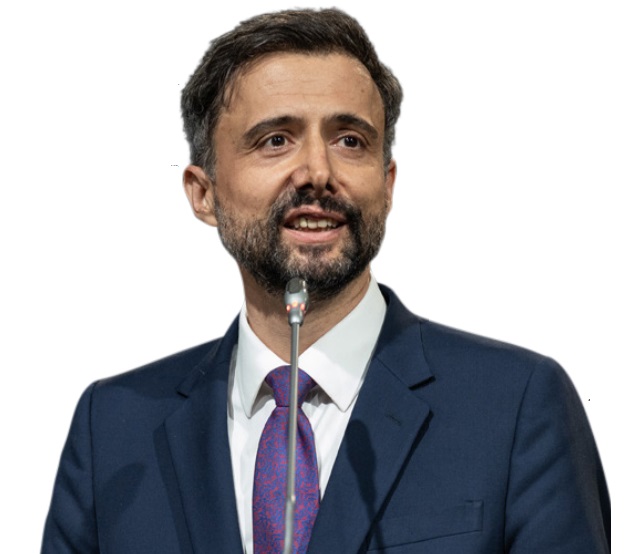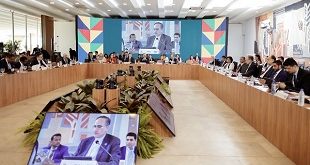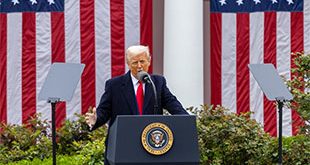
How new IFAD boss plans to halt rural poverty by 2030
Kampala, Uganda | RONALD MUSOKE | On July 7, the Governing Council of the UN’s International Fund for Agricultural Development (IFAD) voted Alvaro Lario from Spain to be its 7th president. Lario beat three other candidates including Khaled Mahdi from Kuwait, Raychelle Awuor Omamo (Kenya) and Shobhana Kumar Pattanayak (India).
IFAD is a specialized UN financial institution charged with investing in rural people. It also empowers them to increase their food security, improve the nutrition of their families and increase their incomes.
Over the last 44 years, the Rome-based UN agency has provided US$ 23.2bn in grants and lower interest loans to developing countries to finance agricultural projects that have reached an estimated 518 million people. In Uganda, over five million Ugandans have benefited from IFAD’s funding to the tune of US$560 million since 1982.
That sounds quite impressive.
But, a day before Lario was elected president, IFAD alongside other UN agencies including the Food and Agriculture Organisation (FAO), the United Nations Children’s Fund (UNICEF), the World Food Programme (WFP) and the World Health Organisation (WHO) published the State of Food Security in the world report.
The report published under the theme, “Repurposing Food and Agricultural Policies to Make Healthy Diets More Affordable,” presented updates on the food security and nutrition situation around the world, including the latest estimates of the cost and affordability of a healthy diet.
It also looked at ways in which governments can repurpose their current support to agriculture to reduce the cost of healthy diets, mindful of the limited public resources available in many parts of the world.
According to the report better known by its acronym ‘SOFI,’ in just two years, 150 million people have fallen back into poverty and hunger. In fact, the proportion of people affected by hunger jumped in 2020 and continued to rise in 2021, to 9.8% of the world population. This compares with 8% in 2019 and 9.3% in 2020.
Around 2.3 billion people in the world (29.3%) were moderately or severely food insecure in 2021 – 350 million more compared to before the outbreak of the COVID‑19 pandemic. Nearly 924 million people (11.7% of the global population) faced food insecurity at severe levels, an increase of 207 million in two years.
Of the total number of undernourished people in 2021 (768 million), more than half (425 million) live in Asia and more than one third (278 million) in Africa, while Latin America and the Caribbean accounts for close to 8% (57 million).
In Africa, 35 million more people were affected by hunger in 2020 compared with 2019, prior to the outbreak of the COVID-19 pandemic, with an additional 15 million in 2021, for a total of 50 million more people in two years.
The numbers also show persistent regional disparities, with Africa bearing the heaviest burden. One in five people in Africa (20.2% of the population) was facing hunger in 2021, compared to 9.1% in Asia, 8.6% in Latin America and the Caribbean, 5.8% in Oceania, and less than 2.5% in North America and Europe. Africa is also the region where the proportion of the population affected by hunger has increased the most.
Lario who has been IFAD’s Chief Financial Officer and Associate Vice President for financial operations appears to understand the task ahead. In the corridors of the IFAD headquarters in Rome, the soft-spoken Lario is described as a champion of private sector investments.
Lario will take up the IFAD helm amid mounting challenges in agriculture and notably for smallholders who are both key to global food security and extremely vulnerable to shocks. Rising global food, energy and fertilizer prices linked to the war in Ukraine now threaten to trigger a global food crisis and push millions more rural people into hunger and poverty.
Lario is now expected to lead the battle against a global food security crisis which has been triggered by the war in Ukraine, climate change and the economic shock of the COVID-19 pandemic. He told the delegates he plans to double IFAD’s impact on rural poor communities in the next eight years.
“We have the institutions to tackle poverty, we have the know-how to reduce inequality, what we need is to mobilise resources and join forces,” he told delegates from 177 member states attending the election held at IFAD’s Rome-based headquarters on July 7.
“IFAD needs to redouble its efforts to ensure that everybody has regular access to nutritious, safe and sufficient food. Food systems and resilient global practices are fundamental to building resilience at the local level.”
“This means increasing local production, increasing the consumption of locally adapted crops and making sure that we support small scale producers in their adaptation to climate change shocks,” he said, adding that there is need to ensure that women, girls and youth have equitable access to economic opportunities and productive resources.
Lario added: “We cannot reach the SDGs without harnessing the power of women and the energy of youth. Half of our population are women. IFAD needs to mainstream further the gender transformative projects that we are currently programming.”
In order to achieve rural transformation, Lario intends to scale-up the agency’s investments in climate smart agriculture, and climate resilient practices and deepen the impact on IFAD’s four main areas of expertise; climate, gender, youth and nutrition.
The IFAD members have already sent an important signal on the institution’s ambition by setting the highest ever resource mobilization target—US$1.55 billion in core contributions for the 2022-2024 IFAD12 period.
This outcome represents a compelling vision of IFAD’s role in contributing to global recovery, rebuilding and resilience in a post-pandemic world. While core contributions will remain the bedrock of IFAD’s financial model, Lario said IFAD will continue to do more to tap into supplementary sources of financing.
Climate finance is a major focus for these efforts and over the past three years, IFAD has mobilized almost US$300 million from sources such as the Global Environment Facility, the Green Climate Fund and the Adaptation Fund.
Lario has promised to make a real difference in the global poverty fight by “putting women at the centre of these programmes and making sure that they have access to these resources and to the decision making in their communities.”
Lario is right.
According to IFAD, there are about 1.7 billion women and girls living in rural areas, representing more than one-fifth of all people in the world. Rural women make up 43% of the agricultural work force in developing countries, and are responsible for much of the world’s food production.
However, they have less access than men to technologies, markets, financial assets and agricultural resources making them far more vulnerable to the impacts of COVID-19.
He said he is also aware that half of the world population is less than 25 years old and this rapid youth population has increased further the fragility and forced migration. This, Lario said, will only accelerate unless rural transformation provides them with opportunities. Partnering with the private sector will be fundamental in providing them these opportunities, he said.
“After 45 years of work, lending to the public sector, IFAD is ready to scale up; the teams are ready to scale up. We currently have the expertise and we will need to make some strategic choices. As IFAD president, I will do so in full consultation with the Executive Board.”
“My long term vision for IFAD is to put it at the centre of food systems, the global climate agenda and the global rural agriculture agenda. My vision for IFAD is for the institution to become an assembler of development finance for SDG 1 and SDG 2.”
“IFAD is a ‘DFI’—a development financial institution—and the ‘D’ comes before the ‘F’ just like in the dictionary. Development comes before finance. Finance is a means to an end.”
“As IFAD president, I will ensure that IFAD connects to the global huge savings of impact investors and pension funds that want to support rural transformation and alleviate poverty and support poor rural farmers in adapting to climate change.”
In order to achieve rural transformation, Lario said he is determined to make sure that IFAD partners with the private sector, with climate like-minded institutions, with national governments and with other multi-lateral organizations whether its multi-lateral development banks or the rest of the UN system as well as, the Rome-based agencies.
“Any solution that covers only a subset of countries will not be sustainable. We need to make sure that we join forces globally. And this also applies to the Executive Board. As President, I will do everything in my powers to build a consensus way forward.”
Lario said he is “more than convinced that the only way to overcome the current challenges is to do it together—all of us to join forces.”
“This is the time to scale up our efforts in building resilience for those who cannot absorb the current shocks and in preparing the institution for a very important replenishment (IFAD 13) which starts in six months,” he said.
****
 The Independent Uganda: You get the Truth we Pay the Price
The Independent Uganda: You get the Truth we Pay the Price



